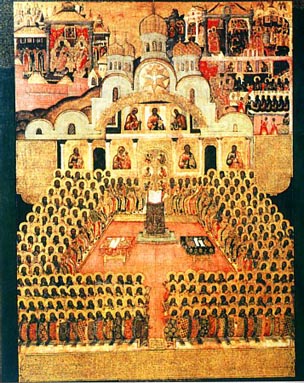
Commemoration of the Holy Fathers of the Seventh Ecumenical Council (787)
Commemorated after October 11
The Seventh Ecumenical Council, convoked by the Empress Irene and met at Nicaea from September 24 to October 13, 787. Patriarch Tarasios (commemorated February 25) presided. The council ended almost fifty years of iconoclast persecution and established the veneration of the holy icons as basic to the belief and spirituality of Christ's Church. As the Synaxarion says, "It was not simply the veneration of the holy images that the Fathers defended in these terms but, in fact, the very reality of the Incarnation of the Son of God."

"The second Council of Nicaea is the seventh and last Ecumenical Council
recognized by the Orthodox Church. This does not mean that there may not be
ecumenical Councils in the future although, in holding the seventh place, the
Council of Nicaea has taken to itself the symbol of perfection and completion
represented by this number in Holy Scripture (e.g. Gen. 2:1-3). It closes the
era of the great dogmatic disputes which enabled the Church to describe, in
definitions excluding all ambiguity, the bounds of the holy Orthodox Faith. From
that time, every heresy that appears can be related to one or other of the
errors that the Church, assembled in universal Councils, has anathematized from
the first until the seventh Council of Nicaea." Synaxarion
In Greek practice, the holy God-bearing Fathers of the Seventh Ecumenical Council are commorated on October 11 (if it is a Sunday), or on the Sunday which follows October 11. According to the Slavic MENAION, however, if the eleventh falls on Monday, Tuesday, or Wednesday, the service is moved to the preceding Sunday.